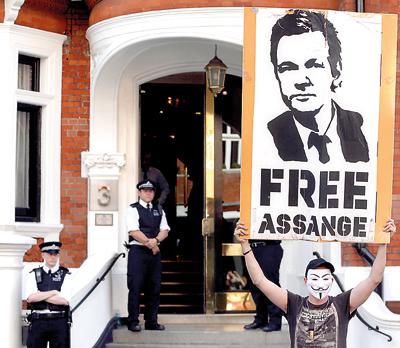Sunday Times 2
British threats in WikiLeaks case ‘stupid’ – expert
View(s):LONDON, AFP) – Britain is considering using an obscure law to extract Julian Assange from Ecuador’s embassy in London, but law experts say the possibility is slim — and one says London’s actions are “stupid”.
Before it granted asylum to the WikiLeaks founder on Thursday, Ecuador made an angry rebuttal of what it saw as Britain’s threats to invade its embassy in London to arrest the Australian and extradite him to Sweden.British officials insist that its explanations to Ecuador ahead of the asylum decision — “setting out our position”, as they put it — never amounted to a threat to “invade” the embassy.

A protestor holds a poster of Wikileaks founder Julian Assange outside Ecuador's embassy in London on Friday. Reuters
In a meeting in Quito on Wednesday, Britain’s charge d’affaires reminded Ecuadoran ministers of a British law which can ultimately allow the government to withdraw diplomatic status from any embassy on its territory.
Under the normal rules of diplomacy, an embassy is out of bounds to the host country — but this could cease to be the case at the Ecuadoran embassy if Britain decides to invoke its Diplomatic and Consular Premises Act.
One phrase in the 1987 legislation could be key: it says an embassy enjoys protection under law unless “the Secretary of State (foreign minister) withdraws his acceptance or consent in relation to (the) land”.After Assange was granted asylum on Thursday, Foreign Secretary William Hague dismissed Ecuadoran claims that they had been threatened with an “attack” on the building in London’s exclusive Knightsbridge district.
“There is no threat here to storm an embassy,” Hague said. “We are talking about an Act of Parliament in this country which stresses that it must be used in full conformity with international law.”One British official told AFP that Ecuador had “twisted our words”.
Chris Brown, Professor of International Relations at the London School of Economics (LSE), said Britain had been “mind-bogglingly stupid to raise the issue in the first place”, regardless of how it was worded.
“Anyone with Diplomacy 101, as the Americans call it, would know that it (the threat) would backfire,” he told AFP.
“If you asked a room of my first-year students about what Britain has done, I believe that even they would not have made such a fundamental error.”
Police are guarding the exits of the embassy in London’s exclusive Knightsbridge district, but have so far made no move to enter it.Brown said there was “no chance” that Britain would apply the law and enter the embassy to extract Assange, who Sweden wants to question over accusations of rape and molestation.
“All it did is deflect away from the main point, which is that Assange is wanted for questioning on a criminal charge,” he said.
“The British government has bumbled into a pointless argument.”Britain’s Diplomatic and Consular Premises Act was introduced after several outrages over embassies in Britain — most notably, the killing of policewoman Yvonne Fletcher with a gun fired from Libya’s embassy in London in 1984.
The law has only ever been used once, to evict squatters from the Cambodian embassy.Brown said that he believed the standoff over the Ecuadoran embassy, just round the corner from the Harrods department store, could only end in one way.
“I cannot see any other solution to this whole thing than him being put on a (Scandanavian airline) SAS flight to Stockholm,” he said.
Carl Gardner, a former British government lawyer and legal commentator, said that if Britain was determined to carry out its threat to arrest Assange and send him to Sweden it should take drastic action.
“It might be better simply to cut off diplomatic relations with Ecuador, send the ambassador home, close the embassy and arrest Assange after that,” he wrote on his blog.
“Ending diplomatic relations is the major sort of foreign affairs decision I doubt the courts would interfere with,” he added. “But that’d be a major diplomatic call.”
comments powered by Disqus























